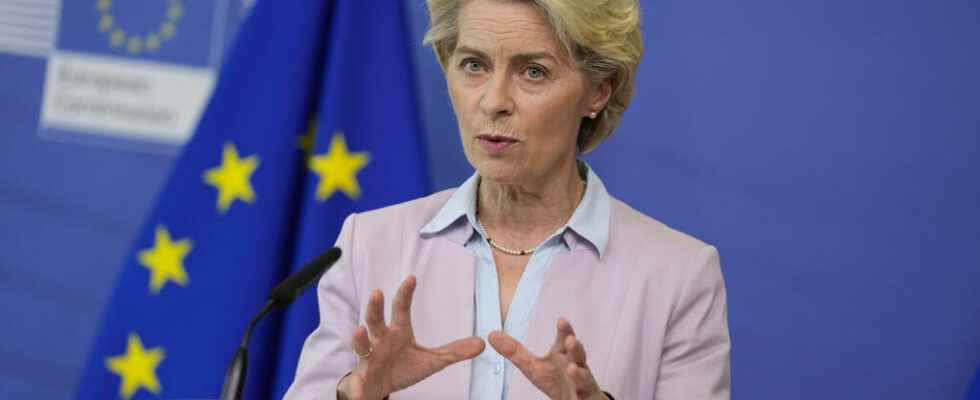European Commission President Ursula von der Leyen is due to deliver her policy speech to the European Parliament on Wednesday. It is expected on many subjects, such as inflation or the energy crisis. If last year, Ursula von der Leyen could congratulate the EU on the management of Covid or show firmness on the rule of law in the face of Central Europe, this year’s speech comes at a time quasi-existential crisis for the European Union.
The crux of this State of the Union address is war on the European continentreports our correspondent in Brussels, Pierre Benazet. As much as the Europeans and their institutions mainly played spectators during the wars in Yugoslavia 30 years ago, they are increasingly involved today in the conflict in Ukraine.
The central concern of the moment is obviously the energy crisis which continues to divide the 27 governments of the Union. And this is particularly the case with regard to the establishment of a ceiling price for gas imported from Russia, which some like Hungary refuse while others like Belgium want to go even further.
► To read also: Europe facing the energy crisis
The Commission will therefore have to propose innovative solutions for energy, as Finnish Prime Minister Sanna Marin asked it on Tuesday in a speech at this same rostrum in the Strasbourg hemicycle. Sanna Marin notably asked the head of the European executive to ” bold new solutions to drive down electricity prices paid by homes and businesses. ” We are now paying a very high price for our dependence on Russian energy. War and energy prices also threaten a global food crisis “, she warned.
The question of European unity should also be at the center of Ursula von der Leyen’s speech, as well as solidarity with, obviously in the line of sight, an effective reduction in energy prices, the only way to convince European citizens that the commitment alongside Ukraine does not obscure the economic future of the Union.
Budgetary discipline
On the economic side, a derogation from the rules of budgetary rigor could be put back on the table. The stability and growth pact, in force in the euro zone, limits the public deficits of the States to 3% of their GDP and their debt to 60% of the GDP. However, because of the Covid-19 pandemic and economic support measures, these rules had to be relaxed and a derogation extended them until the end of 2023 due to the war in Ukraine.
Faced with expenses due to the war in Ukraine, four member countries are asking for the relaxation of these rules because they have decided to rearm as a matter of urgency. Poland even doubled its defense budget. It therefore asks, along with Greece, Romania and Lithuania, for a relaxation of the budgetary doctrine.
This doctrine was designed to limit public borrowing, but now it should integrate threats to the sovereignty and territorial integrity of the countries of the Union, say the signatories who ask in passing not to initiate disciplinary procedures against possible slippages.
The Commission is not against it, but Germany is against it. She pleads for the return of budgetary rigor in the Union. This is the only way, according to Berlin, to limit the explosion of public deficits after the pandemic.
” Hope ” and ” lucidity »
On the side of European parliamentarians, the turbulent period that Europe is currently going through requires a strong speech from the head of the European Commission. ” I’m waiting for a speech of hope “, indicates to RFI, the MEP of the conservative group of the EPP, José Manuel Fernandez. However, he admits that the Commission today is not able to overcome certain problems.
I’m waiting for a proposal speech, that energy and inflation are on the table.
José Manuel Fernandez, EPP MEP
French MEP Manon Aubry calls for ” lucidity from Mrs. von der Leyen. Faced with the economic crisis that Europe is going through, we must call on the big companies that have taken advantage of the crisis to enrich themselves “, she believes, referring to progress in the debate on the tax on super-profits.
Wages in the European Union have risen half as fast as prices, so there is a loss of purchasing power for millions of people. And that is the major issue to which the European Union should provide answers.
Manon Aubry, MEP
